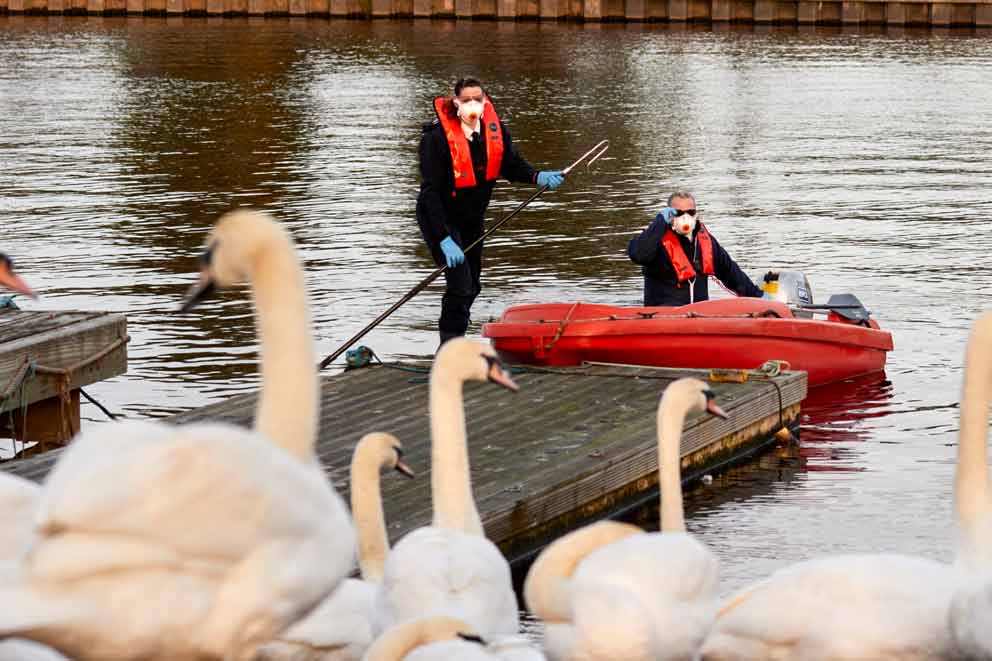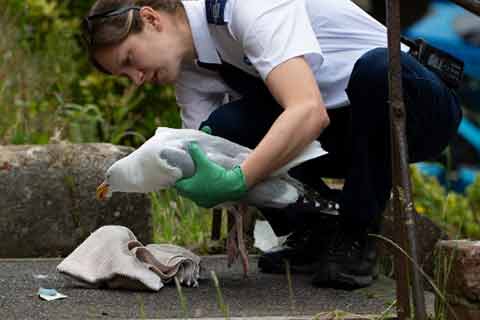Diseases
When there's talk of a disease outbreak it's only natural to worry about pets or livestock. Find out where you can get the latest information, and what to do if you suspect that some animals you own or have seen may be infected.
General advice
- If you see a wild bird that's sick and appears to have bird flu, avoid contact with the bird - including feathers and waste.
- Seek advice from your vet. If you are concerned about the health of your animals, you should always seek expert advice from a vet.
- Keep up-to-date with Defra. The latest information on disease outbreaks, including precautions to take and how to report disease, is available from the Department for Environment, Food and Rural Affairs (Defra). Visit the Defra website. Call the Defra Helpline: 03459 33 55 77. Email: helpline@defra.gsi.gov.uk.
- Contact us. If you are worried about the health or welfare of animals you have seen, tell us about the animal and we’ll guide you to the best and quickest way of getting them the help they need here.
Bird flu advice and what to do
Bird flu (also called avian influenza) is an infectious disease that affects both wild birds and kept poultry. The disease is taken very seriously as it's devastating to birds and spreads very fast. Although some strains have the potential to jump from birds to humans and other animals, this is very rare.
- Bird flu is a notifiable animal disease. This means if you suspect any type of avian influenza in birds in England you must report it immediately by calling the Defra Rural Services Helpline on: 03000 200 301. In Wales, contact: 0300 303 8268.
- Don't touch or pick up any dead or visibly sick birds of these species that you find, as they may have avian flu.
- If you see a dead wild bird, please report it to Defra using the online reporting system or by calling the Defra helpline (03459 33 55 77). The finding will be triaged and the bird may be collected for disease surveillance. Where dead birds are not required for disease surveillance purposes, they may be eligible for other surveillance schemes such as the Garden Wildlife Health Project, which provides useful information on diseases affecting British birds and how you can help the birds in your garden stay healthy.
- Defra guidance on disposing of dead wild birds can be found in their mitigation strategy for avian influenza in wild birds in England and Wales.
The UK's devolved administrations may decide to declare an Avian Influenza Prevention Zone (AIPZ), either regionally, or across the whole of the UK to help reduce the risk of the disease spreading.
All bird keepers (whether you have pet birds, commercial flocks or just a few birds in a backyard flock) must keep a close watch on them for signs of disease and maintain good biosecurity at all times. This is especially relevant if your birds are in a Higher Risk Area (HRA). If you have any concerns about the health of your birds, seek prompt advice from your vet.
Bird flu and other pet animals
Bird flu can infect mammals, including cats, dogs, and other pets. Try to keep your pets away from wild birds to protect them from bird flu.
Further Defra advice on Bird flu: how to keep pets safe can be found on their website.

Poultry keepers
You must register your poultry, even if only kept as pets, so Defra can contact you during an outbreak. This is a legal requirement regardless of the number of birds you have. You can find more information about bird registration here.
In addition to the government advice, there is also a simple guide to protect your birds from bird flu put together by us, Defra, the NFU and other organisations providing best practice advice to help backyard flock keepers.
- For the latest information and advice, including how to keep your own poultry safe in England, please visit the Defra website.
- For poultry keepers in Wales, please see the Welsh Government website.
Bird flu and handling baby birds
The UK Health and Safety agency considers the risk to the public from the current strain of bird flu to be low. However, Defra advises the public not to handle any dead wild birds, or those which may have bird flu.
If you choose to handle an injured wild bird, please follow our advice below to minimise the risk of exposure to bird flu. This is particularly important if handling birds at higher risk of bird flu, such as ducks and other water birds. If you see a bird that needs help, visit our 'report a concern' tool for advice. Other contact with wild birds should still be avoided.
What to do with the birds you can handle
If you find an injured bird please visit our report a concern tool for further advice. You may be asked to take the bird to a vet or wildlife centre (call first to make sure that they can take the bird). Please follow this advice to keep you and the bird safe.
What to do with the birds you can handle
If you find an injured or sick bird (apart from waterfowl, sea birds, game birds, or birds of prey) please visit our report a concern tool for further advice. Take the bird to a vet or wildlife centre (call first to make sure that they can take the bird).
Protect yourself
Wear thick gloves like gardening gloves, long sleeves, eye protection like safety goggles or glasses, and face cover to reduce the risk of scratches and bites.
Handling the animal
Try to keep contact to a minimum and at arm's length if possible. Can you use a broom, net or shovel to move them? Don't lean over the animal or get your face close. Where possible use a blanket or towel over the animal to calm them and protect you and move them straight into a secure box with air holes.
Try to limit contact with wild animals and stay as calm and quiet as possible. It may be safer to ask someone to help you but please do not be tempted to ‘show’ the animal to others once it’s confined as it may be stressful for them and puts them at risk of being injured and could give the animal a chance to escape.
Transporting the animal safely
Where possible restrain the box in your vehicle in the boot or with a seatbelt to prevent the animal escaping while you are transporting them. For birds keep them as far away from you as possible and have the windows open for ventilation.
Take care afterwards
Please always wash your hands and clothes after handling an animal, and disinfectant surfaces and items if the animal has come into contact with any. Seek medical advice immediately if you have any injuries or signs of illness after handling an animal.
Found a dead baby bird
Anyone who has found a dead baby bird should follow Defra's advice for the public. You can also report dead wild birds to Defra.
Alabama Rot
Alabama rot, otherwise known as Cutaneous and Renal Glomerular Vasculopathy (CRGV), is a rare disease that affects dogs. It damages the blood vessels in the skin and kidneys, which causes visible sores on the skin and can lead to severe organ dysfunction and ultimately kidney failure.
Bovine TB
Bovine Tuberculosis (bTB) is an infectious disease of cattle. It's caused by the bacterium Mycobacterium bovis (M. bovis), which can also cause disease in many other mammals, including badgers.



